Arts & Culture
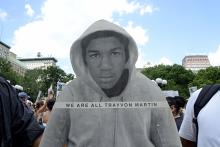
America’s allegiance is not to black and brown bodies. It is bound to prejudice, racism, militarism, and violence predominantly against people of color. And while Black Lives Matter rose as a voice and movement for black lives, the NAACP’s Youth & College Division amplified its voice, and black Americans across this nation cried out, the American majority kept quiet.

“Our current economies are running a Ponzi scheme with our planet,” Mathis Wackernagel, chief executive and co-founder of Global Footprint Network, said. “We are borrowing the Earth’s future resources to operate our economies in the present. Like any Ponzi scheme, this works for some time. But as nations, companies, or households dig themselves deeper and deeper into debt, they eventually fall apart.”
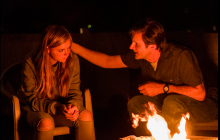
Most of us who managed to survive middle school regard it as the most awkward time in our lives, when we cared deeply about how others see us, but were just as deeply unsure of how we saw ourselves. Eighth Grade uses that to tell a story about perception, one which applies to adults as much as it does to 13-year-olds. Burnham’s film explores how we want to be perceived by others, the harsh ways we perceive ourselves, and the way we’re perceived by those who see us fully, and love us unconditionally.

“It's easy to catch a heat stroke from prolonged exposure to the sun and the humidity here in the district,” said Reginald Black, a homeless journalist and vendor for Street Sense, a local newspaper produced and distributed by homeless individuals.
5. Loneliness Is the Common Ground of Terrorism and Extremism
“What is the right way to deal with these lonely extremists? If Arendt is right, then the structural causes of loneliness run deep – often, far too deep for a few personal connections to make a difference.”
6. Inside the Cross-Country Journey to Reunite an Undocumented Mother with Her Three Children
The TIME documentary follows Yeni González, as grassroots activists banned together to get her out of detention in Eloy, Ariz., to her kids in New York City.

No more breaking news breaking our hearts.
No lock down drills, students learning
to drop to the floor, out of the line of vision.
No bump stocks. No more AK 5’s, 47’s. No need
for women to open their purses before they enter
the play, the movie, the concert. And no need
to fear windows that offer vantage points
for taking aim.

A direct reboot of Bravo’s Queer Eye for the Straight Guy, which debuted in 2003, Queer Eye is, on its surface, a makeover show in which five gay men –– Jonathan Van Ness, Tan France, Antoni Porowski, Karamo Brown, and Bobby Berk –– help transform their clueless subject, or “hero,” in five areas: grooming, fashion, food, culture, and home decor. But each episode becomes more than a makeover as the men of that Fab Five break through the hero’s walls and reach the root of their low self-esteem. That’s where the true emotions rise to the surface.
1. When a DNA Test Shatters Your Identity
The generation whose 50-year-old secrets are now being unearthed could not have imagined a world of $99 mail-in DNA kits. But times are changing, and the culture with it.
2. Shadow Politics: Meet the Digital Sleuth Exposing Fake News
Buried in media scholar Jonathan Albright's research was proof of a massive political misinformation campaign. Now he's taking on the the world's biggest platforms before it's too late.

![]() The idea of humanity, excluding no one, Arendt wrote, “is the only guarantee we have that one ‘superior race’ after another may not feel obligated to follow the ‘natural law’ of the right of the powerful, and exterminate ‘inferior races unworthy of survival.’” As she herself witnessed, the first steps are the abrogation of minority rights and the refusal of asylum to refugees.
The idea of humanity, excluding no one, Arendt wrote, “is the only guarantee we have that one ‘superior race’ after another may not feel obligated to follow the ‘natural law’ of the right of the powerful, and exterminate ‘inferior races unworthy of survival.’” As she herself witnessed, the first steps are the abrogation of minority rights and the refusal of asylum to refugees.
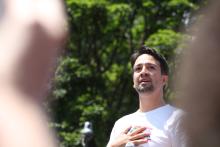
I look for his tweets in the morning, and I put off going to bed until he tweets at night. It’s evening now, and I’ve had a hard day, and struggled with my work, and I’m waiting for today’s benediction. I’m waiting to be told what I already know I will be told, because it is part of the liturgy, and because it will be a reprise of this morning’s tweet. Still, I’m eager to read the words.

There’s a lot going on thematically in Sorry to Bother You. Cash has to deal with the indignity of trading success for being his authentic self. As an artist, Detroit also struggles with selling out —she, too, has a “white voice,” but instead of selling a product, she’s using it to sell herself. The news media covering the RegalView strike is addicted to easily-repeated clips rather than the whole story, as when a protester who throws a can of cola at Cash becomes famous when the incident goes viral. Our willingness to laugh at rather than empathize with the struggles of others is also displayed through a popular game show called “I Got the S**t Kicked Out of Me,” where contestants get beaten up and dunked in excrement.

And then jazz enters the scene, a music that grapples with chaos and comes out with soul. In the tension of clashing notes and melodies, fingers flying across valves and keys, the band finds a groove that communicates the experience of the civil rights movement
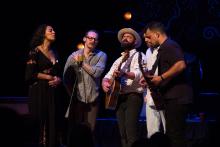
Ramirez: I think like what you said, it's taking the side of the broken, the beaten, and the defeated. It’s knowing that when you say, “You just gotta lift yourself up by the bootstraps,” that not everybody has boots to be lifted up by. Justice looks like that. It looks like taking the side of the one being accused, the one being pummeled, not even just today, but throughout history because there are whole people groups who have been pummeled. Justice looks like giving people a taste of a true Jesus. Jesus would go to the woman at the well even if all of culture said not to, even if people looked down on him, even if it might have been bad for his reputation, that’s what he did. So often we like to tell good stories and take pictures of refugees and orphans somewhere else, but we very much like to ignore the causes that we should be fighting for here. For me, that's what justice looks like.

But in 2017, only 33,000 refugees resettled in the U.S., the country’s lowest total since the years following the Sept. 11 terrorist attacks and a sharp decline from 2016, when it resettled about 97,000.

This is not a time for the marketplace of ideas. There are people who believe that immigrant children are criminals. There are people who act as though queer folks are an abomination. There are people who consider every black and brown person to be a threat. These ideas are not worth debating. Logical conversations will not dissuade oppressors. Civility has never transformed the reality of the marginalized and it never will.
1. How We Treat Immigrants Is How We Treat God
“There may be political, economic, and personal reasons for an unwillingness to love immigrants, but according to Jesus, there are no spiritual ones."
2. Hey, White People: Pixar’s Dumpling Short ‘Bao’ Isn’t About You
A uniquely Chinese immigrant story has left white, Western moviegoers baffled.
Brain imaging is illuminating the neural patterns behind pain’s infinite variety

Protestors have marched the streets of downtown Pittsburgh since Rose, 17, was fatally shot three times by an East Pittsburgh police officer as he ran from a vehicle, after it was stopped by police who were investigating a nearby shooting.

Yes, goodness and altruism in others may seem rare. But the importance of Won’t You Be My Neighbor? lies in showing us that it’s not impossible, and may be easier to generate than we think.
1. AUDIO: Good News or Bad News? The Meaning of ‘Evangelical’ in Today’s America
Jim Wallis recorded this episode of his podcast Soul of the Nation live from The Summit, Sojourners’ annual gathering of leaders and change makers. Here, he talks with some of those leaders to discuss what the word “evangelical” means in our present context.
It takes physically showing up.
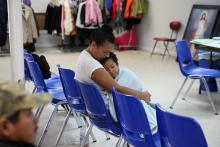
In some instances, these parents are saying they don’t know where their children are or how they will be reunited with their kids. Marco Antonio Muñoz took his own life in a Texas jail soon after the government “separated” the Honduran man, his wife and their 3-year-old son. The undocumented family had entered the U.S. to seek political asylum.